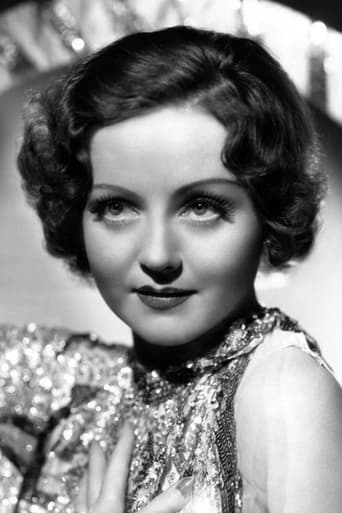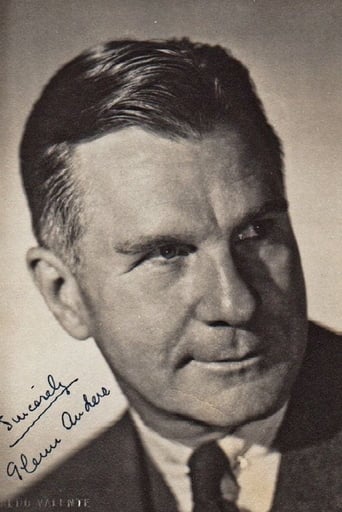ChanBot
i must have seen a different film!!
Baseshment
I like movies that are aware of what they are selling... without [any] greater aspirations than to make people laugh and that's it.
Hattie
I didn’t really have many expectations going into the movie (good or bad), but I actually really enjoyed it. I really liked the characters and the banter between them.
Billy Ollie
Through painfully honest and emotional moments, the movie becomes irresistibly relatable
marcslope
Those describing this as an early screwball comedy are telling only half the story--it's also a romantic drama, and, more surprisingly, an existential meditation. The theme is, as noted, quite reminiscent of "Holiday" and the later "The Philadelphia Story"--love among the privileged, with interlopers from the less privileged, and the ability or lack thereof to have a sense of humor in high society. But it's quite sad, too -- Glenn Anders' character meets a sorry end, and that ruins Diane Ellis's life. What's really moving is watching Nancy Carroll, never more radiant, having to choose between security and her true self, and her interaction with Fredric March, unusually loose and spontaneous; their scene in the cab actually moved me to tears, both for its content and their playing of it. This is how it's done, folks. For a screwball prototype it has unusual depth of feeling. Add to that sumptuous Deco trimmings, technical prowess that belie its Astoria Studios origins, and some exciting location New York filming. Hard to catch a copy of this one, but it's worth the search.
wmorrow59
It hasn't received much critical attention, but Harry d'Arrast's comedy-drama Laughter is more than just an interesting and entertaining movie: it's a milestone in Hollywood's treatment of romantic comedy, a prototype for the "screwball" style produced several years before the term was in popular use. That's not to say that this film is as funny or wild as, for instance, Bringing Up Baby or Twentieth Century; despite its title, Laughter includes a lot of serious and surprisingly downbeat material, but it does point the way to the screwball genre in subject matter (i.e. the interplay of love and money) and tone, especially in one key sequence. It's also very well made for its time, and looks all the more impressive compared to other movies released in 1930, when the new technology of sound was still an impediment to smooth filmmaking technique for so many directors.The story is focused on a young woman named Peggy (Nancy Carroll), a former Follies girl who has been married for a year to wealthy broker C. Morton Gibson (Frank Morgan). For a broker he seems like a fairly decent chap, but unfortunately he lacks any trace of humor or spontaneity. Morton never laughs and seldom even cracks a smile. The couple, who live in a fabulous Deco mansion filled with servants, never display any genuine warmth for each other, and barely seem to be acquainted. It's clear that in marrying this man Peggy made a calculated financial deal, trading her youth and vitality for the security of this man's wealth. It's also apparent that Peggy is still struggling to clean up some messy situations left over from her earlier life; in the opening sequence an emotionally unstable artist named Ralph (Glenn Anders) who believes he's in love with Peggy threatens to kill himself over her. Throughout the film there are several scenes set in Ralph's grungy studio, where low-down bluesy music always blares, and the contrast with Gibson's spotless, quiet mansion is striking.Peggy's situation hits a crisis when a former suitor named Paul Lockridge (Fredric March) returns from Europe. Paul is a breezy, fun-loving composer who disapproves of Peggy's marriage and is determined to shake up her life, which he quickly succeeds in doing. March is terrific in this role. Viewers familiar with his later, more stately performances may be surprised at how energetic and loose he is here, like Cary Grant in his heyday. He makes himself at home in the Gibson mansion, rummaging around in the fridge, gnawing a chicken leg and washing it down with beer, and playing his tunes on the piano. (His rowdy playing is pointedly contrasted with Mr. Gibson's fussy plink-plink-plinking at the keyboard.) In the film's "screwball" highpoint, Peggy and Paul go for an afternoon ride out on Long Island. They run out of gas, get caught in the rain, and accommodate themselves by breaking into a house whose owners are away. What's notable about this sequence is the pair's playful attitude: they treat the whole thing as a lark. They decide that the place belongs to a couple named Smith and portray them, only Peggy is Mr. Smith and Paul is the Missus. They wrap themselves in bearskin rugs, and that's how we find them at breakfast the next morning. Unfortunately the runaway couple can't sustain the antic mood when reality crashes in on them. They're arrested, but when the identity of Peggy's husband is revealed they're quickly released and given a police escort home. That's when Paul informs Peggy that, for all her riches, what she lacks is laughter, and the lack of it is smothering her. "You were born for laughter," he tells her. "Nothing in this life of yours now is as important as that."The attitude towards wealth is striking, considering that the Great Depression was the inescapable calamity of the era. Here we encounter an attitude that would be reiterated and refined in later screwball comedies, that is, Depression or no Depression, money is worthless if you're not happy with your life. (Of course, money comes in handy if you're starving, but that's a different debate for another time.) Peggy comes to realize that she'd rather gamble on uncertainty and "laughter" than settle for an embalmed existence under C. Morton Gibson's roof, and Nancy Carroll is so lively and convincing in the role we choose to believe her. Whenever I see one of Carroll's films I wonder why her career didn't flourish; in addition to being very pretty she was an actress of nuance and versatility. She and March are first-rate in Laughter, and so is Frank Morgan, in a sympathetic portrayal of an emotionally stunted man. Morgan gives a restrained, carefully calibrated performance entirely free of the blustery shtick that became his trademark later on. His C. Morton Gibson seems fully aware of his shallowness but unable to develop as a person, frustrated and angry but essentially masochistic in his unwillingness to take charge as events in his household spin out of control. We identify with Peggy & Paul and want to see them break away, but Gibson is a surprisingly poignant figure.Laughter is a well-written, polished film that deserves to be better known. It's not in the same league as the later screwball classics when it comes to humor, but taken on its own terms it's an intelligent piece of work that deserves credit for its groundbreaking approach to romantic comedy.
sunsetboulevard16
Harry D'Abbadie D'Arrast always complained that this movie, which he considered his best, was undeservedly forgotten, for it created many concepts which would reappear in comedies of later years.This time he was right. It is surprising to find in such an early film the conflict between economical safeness and spiritual freedom that would later be typical of such wonderful films as Frank Capra's You Can't Take It with You, and very especially, George Cukor's Holiday (not a surprising coincidence, since it was written by the same screenwriter as Laughter).It is an answer to the existentialism dilemma, where the only choices to make are living for the future (marrying a millionaire) or for the present (enjoying the moment you're currently living). Laughter goes even further than the later films, for it incorporates a third answer: suicide, which takes the story for the path of melodrama with a surprising respect of its unity.In fact, what is most curious about Laughter is that it is much more mature that one would suspect. The structure of the story, the performances and even the humor feels fresher than those of other comedies of the period. A good example is the surprising scene in which Fredric March and Nancy Carroll do some role playing just for the sake of it: they pretend to be a marriage in which he is the woman and she is the man. They both imitate the conventions of each sex's supposedly proper behavior, making fun of predetermined attitudes and social obligations, clearly defending sponaneity and freedom as opposed to that which they parody/criticize (social roles conditioned by sexes).Also the way the structure of the story is inventive enough, with a past time we never see but which is reflected in the present, and a triggering opening which serves as the conclusion of the movie as well. In fact, many other the elements of the movie (starting by the title itself) are developed in more than one level, like this one.The biggest fault of the film is not in its final quarter (which, contrary to what I had read, seems to me fluid and coherent with the rest of the film): it is a number of technical limitations, which harm its rhythm for today's audience. These were common in the beginning of sound film (Lubitsch somehow avoided most of them in The Love Parade, made one year before this and quite a miracle).The shortcoming I found most annoying was the impossibility for the camera to show the characters in a more frontal angle than the profiles during dialogs, which gives some important scenes a very old fashioned stagy feel.(It had to do with the sound equipment: for what I know, they couldn't edit the sound they recorded, so they had to film each scene with several cameras so that they could use full takes of sound. So there could only be one light setup, and therefore, the characters had to be filmed from the only side where the light was better).However, compared with most movies of that period, Laughter is a clear winner, and it is no wonder that March considered it one of his best films. His performance is relaxed, joyful and attractive still today, and so is Nancy Carroll's.It is a pity that D'Arrast is not better known today, nor this movie properly restored/distributed. It is a interesting work on many levels, by a highly original and innovative filmmaker.
purplecrayon
I was expecting this movie to be much more than it was. I read that it was one of Fredric March's personal favorites, his others being A Star is Born, Death Takes a Holiday, and Best Years of Our Lives, and so since he liked it I thought it was going to be really good. I must say I was really bored with it. The story seemed boring and not really well written. I think it could have been a much better story if the script was better. As is, there were too many loose ends. Sure, there were some funny moments (it was enjoyable to see Fred draped in a white bearskin rug!), and Fred gave a few kisses, and you got to see him in his undershirt. But I have seen him in MUCH better roles, more romantic, more funny...everyone's opinion is different. This is mine...It is one of the few Fred movies I didn't really like.




